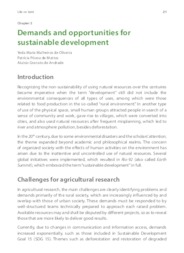Demands and opportunities for sustainable development.
Demands and opportunities for sustainable development.
Author(s): OLIVEIRA, Y. M. M. de; MATTOS, P. P. de; ANDRADE, A. G. de
Summary: Recognizing the non-sustainability of using natural resources over the centuries became imperative when the term "development" still did not include the environmental consequences of all types of uses, among which were those related to food production in the so-called "rural environment." In another type of use of the physical space, small human groups attracted people in search of a sense of community and work, gave rise to villages, which were converted into cities, and also used natural resources after frequent misplanning, which led to river and atmosphere pollution, besides deforestation. In the 20th century, due to some environmental disasters and the scholars' attention, the theme expanded beyond academic and philosophical realms. The concern of organized society with the effects of human activities on the environment has arisen due to the inattentive and uncontrolled use of natural resources. Several global initiatives were implemented, which resulted in Rio-92 (also called Earth Summit), which embraced the term "sustainable development" in full.
Publication year: 2019
Types of publication: Book sections
Unit: Embrapa Forestry
Observation
Some of Embrapa's publications are published as ePub files. To read them, use or download one of the following free software options to your computer or mobile device. Android: Google Play Books; IOS: iBooks; Windows and Linux: Calibre.
Access other publications
Access the Agricultural Research Database (BDPA) to consult Embrapa's full library collection and records.
Visit Embrapa Bookstore to purchase books and other publications sold by Embrapa.

